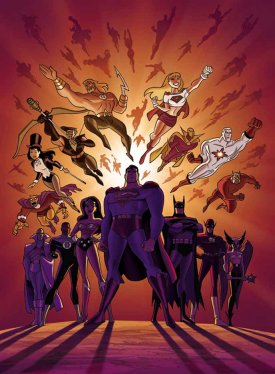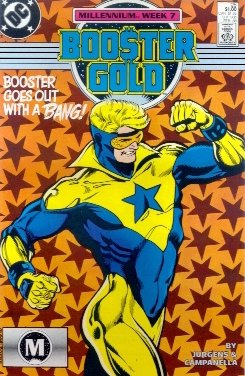|
Justice
League Unlimited
The Greatest Story Never Told
Original Airdate - 09/11/04
My favorite
episode of Buffy The
Vampire Slayer is called The Zeppo. Rather
than follow the usual main plotline where Buffy and friends
go off to fight the biggest battle they have ever had, the
camera follows Xander. He's recently been made to feel like
the weak link in the chain of Buffy's support group and
in an effort to prove himself he breaks away from the pack
and instead has a series of mishaps and adventures during
the course of the evening. As the night ends, Xander hooks
back up with his friends and has learned a valuable lesson
about himself and what it means to be a team player.
This
week's JLU follows a similar plotline as we discover
that Booster Gold longs for fame and glory as a superhero
but ranks just below Vibe on the "who to call in case of
emergency" list. So while the rest of the entire Justice
League is off fighting the Dark Lord Mordru, Booster Gold
is doing crowd control.
Booster
Gold has for the most always been a comedic hero and his
brand of shenanigans are far more entertaining than watching
Batman chase a pig. This is the second episode in a
row that feels at home in the 30 minute time limit, perhaps
because it has the plotting of a sitcom. By the time the
final credits roll, you can almost hear the studio audience
applauding.
And
applaud they should because the episode is a winner. It's
a character story that explores what makes Booster Gold
tick and the action in the show actually affects him.
The
episode has a clear arc as a goofball becomes a hero (of
sorts), with some funny lines to boot. Billy West scores,
as usual, with his voicing of Booster Gold's computerized
pal Skeets. The football-shaped robot gets the best film
reference in, toning down a line from 2001: A Space
Odyssey for a family audience.
The
only hiccup was an odd edit for a commercial break that
never happened. Perhaps they're planning for re-runs on
the Kids WB!, where they need some extra time to sell cereal
and toys.
An interesting idea that I'm pretty sure
won't happen is to have a follow up episode where we actually
see what the Justice League was doing while Booster was
running around saving ant farms.
Derek's
Continuity Corner
Ah, Booster
Gold. Originally intended to be fun but not necessarily
incompetent, he settled into the role of DC Universe joke
quite nicely.
Michael
"Booster" Carter started out as a 25th Century
college football player, a tremendous success until he started
betting on his own games. Disgraced and with his own future
in tatters, he ended up as a security guard at a Metropolis
museum, a largely ceremonial job as most of the patrolling
was done by little flying computer drones. Deciding that
the only way to regain his past glories was to go back into
the past (a decision alluded to in this episode), Michael
stole a bunch of historical equipment that he knew would
still be advanced in the 20th Century. This included a lightweight
exo-skeleton for super strength and a Legion of Super-Heroes
flight ring that had somehow ended up in the 20th Century
and put on display in the museum.
Skeets,
one of the flying computers, tagged along, and together
they tried to set up Michael, now calling himself Booster
Gold, as Metropolis' premier hero. Of course, Metropolis
already had Superman, and the original comic book series
bounced between Michael learning the responsibility of being
a superhero and the trickier job of maneuvering legal, licensing
and endorsement deals.
After
a few years, Skeets was destroyed and Booster's solo book
ended. Booster Gold joined the Justice League, as in the
funny one written by J.M. DeMatteis and Keith Giffen. Often
teamed with Blue Beetle, Booster Gold spent more time trying
to leverage his new team fame than he did fighting world-threatening
menaces.
Eventually
he retired from the superhero game and opened the successful
chain of "Planet Krypton" theme restaurants that
play a pivotal role in Mark Waid's sequel to Kingdom
Come, The Kingdom. Recently, Booster came out of retirement
for Formerly Known As The Justice League, still
not that competent a hero.
Also
glimpsed in this episode: Mordru, originally a foe of The
Legion of Superheroes in the 30th Century, but within the
past two decades given a younger 20th Century incarnation
that has fought Amethyst, Princess of Gemworld and the JSA.
(The older version is used in this episode.) Normally, Mordru
can be defeated by being buried in the earth, a solution
not mentioned in "The Greatest Story Never Told."
Booster's nemesis in this episode bears a thematic resemblance
to a Flash enemy/ally, Chester Runk a.k.a. Chunk.
Other
heroes appearing in this episode include Vibe, long dead
in comics, The Vigilante (the original 1940's version) and
The Shining Knight. Both The Vigilante and The Shining Knight
are actually members of The Seven Soldiers of Victory, a
short-lived team concept from the Golden Age that also included
Green Arrow and The Crimson Avenger. Ironically, their best-remembered
adventure is in a team-up with the Justice League and Justice
Society, reprinted in the recently released third volume
of Crisis On Multiple Earths.
Rumor
has it those last two will have more prominent roles in
future episodes of JLU, so I'm sparing myself their backgrounds
this week.
Finally,
Cartoon Network is missing a good bet by not trying to develop
Star and S.T.R.I.P.E. into an animated series for kids.
They show up briefly here, but Geoff Johns' creations are
ripe for further appearances. A teen girl with an energy
blast that allows her to fly and simulate super-strength
teams up with her stepfather who has a remote control giant
robot he uses to keep an eye on her. Sounds like a no-brainer
to me, but then, I'm not a network executive.
|







